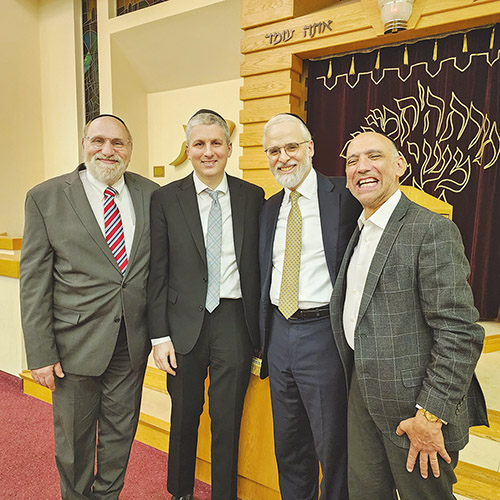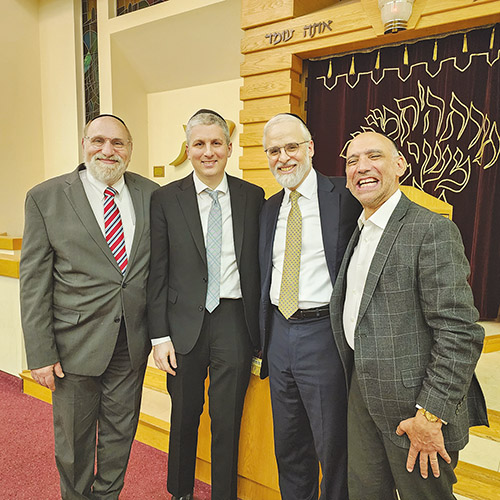
What does the future hold for Orthodox Jewry? Rabbi Moshe Hauer, executive vice president of the Orthodox Union (OU). tackled that topic as he presented “Orthodox Jewry Looking Forward from 2023” at the Orthodox Forum of Edison/Highland Park’s final presentation of the season. Nearly 50 people joined the session, in person and via Zoom, on Motzei Shabbat, March 18 at Congregation Ohr Torah in Edison.
Following a welcome by Mark Abraham, Orthodox Forum chair, Jeff Korbman introduced Rabbi Hauer as a former pulpit rabbi with dozens of years of experience. Korbman, director of Foundations & Strategic Partnerships at the OU, added that while he has many colleagues who are learned Torah scholars and many whose warmth and sensitivity are remarkable, Rabbi Hauer distinguishes himself by belonging in both categories.
Noting that he had ‘left my crystal ball at home,’ Rabbi Hauer began with the notion that there are four areas of challenge and opportunity that he would address regarding the future of Orthodox Jewry.
The first can be compared to the challenges faced by the people of Israel as they left the land of Egypt. The Israelites entered the land as a family group, grew in number, and prospered. Hauer offered an additional definition that the growth of the Israelites was specifically in their levels of religious observance. The Egyptians only objected to the presence of the Israelites when they became successful and adhered to their practices. He added that it wasn’t a “dispute of democracy, but one of demography,” making the comparison to the demonstrations in Israel over changes to the proposed judicial reforms.
There are “only concerns when the balance of power impacts or changes the power” of a particular group. Demographic growth of religious Zionists and Haredi/Chasidic groups in Israel has made secular Israelis fearful. “Jews should not be fearful of other Jews,” added Rabbi Hauer. The controversy between religious and secular Jews extended as far as the founding of the State of Israel when the publishing of the Declaration of Independence was delayed over debate of whether or not to include the mention of Hashem.
Why is one side so frightened of the growth of the religious sector? According to Rabbi Hauer, lack of knowledge of the other “side” leads to misinformation, distrust and fear. “If both sides would meet in a room to talk, they would come out with an understanding of each other. But that doesn’t happen,” he said. Rabbi Hauer continued that the growth of Orthodox communities helps all Jews, but also comes with great responsibilities. “Orthodox Jews have the responsibility to make all Jews part of the community, and show that Orthodox growth is a strength and asset rather than a threat,” adding that the situation is similar to that of the time before the exodus from Egypt where the Israelites left as a great nation. The present turmoil may be the start of the next redemption.
The second issue is the challenges of affordability for the Orthodox community. High costs of education, food and housing are often considered unsustainable. The rapid growth of the Orthodox communities has seen costs increase rather than decrease. While not necessarily a crisis, it is a growing concern. Orthodox people like to live together in established communities and within walking distance to a synagogue, leading to higher home prices in those areas. Two solutions to address the issue are to consider new, emerging and less established communities in the United States or making aliyah to Israel.
Identifying Orthodox community growth is another critical feature. Intensely right-wing Orthodox communities are growing the fastest. Yeshivish and Chasidic communities are experiencing the highest levels of growth and the lowest attrition rates, but every part of the Orthodox world is growing. The key is not only to maintain traditions while pursuing other things but maintain passion in Jewish life as well.
Lastly, not only does the Orthodox community need to increase their passion and knowledge for religion, it needs to be passed on to others. We need to “make sure we are part of the growth of passion, making it a unified position of what we do.” Rabbi Hauer cited a story of an Israeli cab driver who said he started observing the Sabbath after seeing the behaviors and goodness of a religious passenger that he regularly transported. It is critical to eliminate the hatred against the religious demography that is passing under the guise of protests of democracy.
The lively Q&A section that followed the talk included questions on various topics. Asked whether he was concerned about the rise of antisemitism in the United States and if there were similarities to the rise of Hitler’s power, Rabbi Hauer noted that there are significant differences. Antisemitism today is called out by governmental leaders and apologies are demanded. Nazi Germany in 1933 approved and permitted antisemitic remarks and actions.
Another question concerned interaction of the Orthodox community with those who identify as Conservative or Reform. Rabbi Hauer replied that since the Conservative and Reform communities do not agree with upholding the 13 principles of faith, the Orthodox community cannot coordinate with them on religious matters. But the Orthodox community has an obligation to work with Jews of all levels of observance to work together for issues related to the community.
The Orthodox Forum is a grassroots organization bringing discussions of contemporary religious issues and ideology to the community. For more information, visit www.OrthodoxJewishForum.com.
By Deborah Melman










